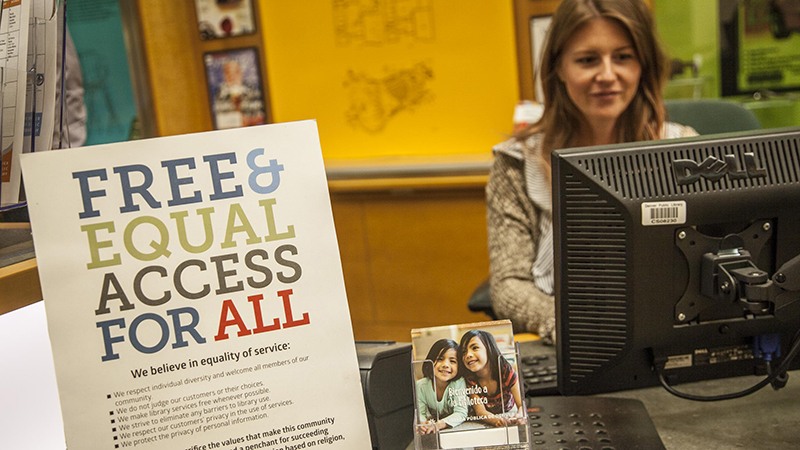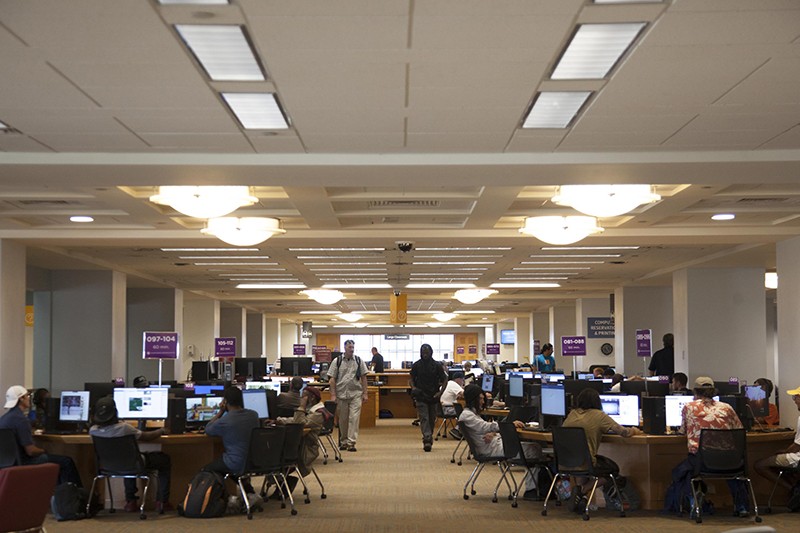
Denver Public Library officials did away with overdue fines in part to ensure people wouldn’t be afraid to utilize the library’s many services beyond borrowing books. Photos by James Chance
Denver Public Library officials did away with overdue fines in part to ensure people wouldn’t be afraid to utilize the library’s many services beyond borrowing books. Photos by James Chance
Following the example of many other public libraries—including in Boulder and Colorado Springs—the Denver Public Library in January ended its policy of daily fines for overdue books and cancelled all past fines on every borrower’s record.
“We get it,” the library told Denverites in a post on its website. “Sometimes it’s hard to return materials to the library… but being fined for late returns can be frustrating enough to make people not want to borrow again from the library. We want people to access our materials, so we set out to change the way we do business…”
In a FAQ for libraries in Colorado, the Colorado State Library explained the rationale for ending overdue book fines: “A core mission of libraries is to provide equitable service to all residents in their communities. Overdue fines go against that mission by disproportionately affecting residents in low-income households the most. These patrons may have transportation challenges… [t]hey may work multiple jobs, be single parents, or have unstable housing, all leaving them with limited time to visit the library.
“Thus, these patrons are most likely to have library cards blocked due to high fines, and these… very residents that need access to library collections the most—are less likely to check out materials.”
Michele Jeske, Denver’s city librarian, says book borrowing wasn’t the only casualty of the fines—which, incidentally, all went to Denver city and county coffers, and not to the library, adds Jeske. She says many people assumed that overdue fines meant that they and their families were barred from using any library services in the city.
Some of these library services have well-documented links to improved health and well-being. They include staff social workers, who help connect patrons with housing, food and health benefits; internet access; homework help on site or by phone for students of any age; classes on citizenship and language; children’s story hours; summer food programs for children; bicycle repair kits; passes for state parks; and lottery drawings for free tickets to arts performances.
“Eliminating overdue fines is paramount to providing equitable access for all customers,” says Jeske. “We want to… get library members back into our buildings to use materials and enhance their quality of life and education.”
Since the fines were lifted in January, librarians at the Denver branches have begun to see an uptick in new and returning visitors. One woman, a victim of domestic violence, told staff that she had stopped coming after fleeing her home and leaving overdue library books behind. Other borrowers told librarians that they were new to Denver and had overdue fines in their home cities, which they assumed (incorrectly) made them ineligible for a Denver library card or any of its services.
“I cried. There have been times in my life where getting a late fee meant I no longer had access to books or internet,” tweeted one Denver-area resident upon learning of the fine waiver.
Library cards—which require a home address—are still needed to borrow books, in-demand Wi-Fi hot spots for three-week home use, and to use onsite computers for an hour at a time. The library offers 15-minute computer access to non-card holders.
Only the fines are being waived. Borrowers must still return all materials they owe the library before they can borrow any other books or other materials the library loans out. Borrowers will have to pay replacement fees for items they can’t find, as well as possible fees if the library turns over the case to a collection agency. But Jennifer Hoffman, manager of books and borrowing for the Denver Public Library, hopes people will reach out to library staff instead of letting the item go to collections, since staff are allowed to negotiate the replacement price or possibly waive it for people who cannot afford to pay.
The library also has steps in place to help avoid having a book overdue. Book borrowers can sign up for email or text notices when a book is due, and can renew borrows online up to three times if no one is on a waiting list for the same item.
Both current and upcoming services make the library staff even more excited to welcome new and returning patrons, says Rachel Fewell, the central administrator for the main Denver Public Library branch and an adjunct professor of library sciences at the University of Denver.
On a recent tour of the main branch, Fewell pointed to a roving librarian who answers calls to her cell phone and comes to patrons to help them find what they are looking for. The central branch in Denver, and many other library branches, have “idea labs” (also known as “maker spaces”) that do not require a library card. Many of the labs have drawers filled with just about every supply a family needs for school projects.

Karim Lopez, a peer navigator at the Denver Public Library main branch, assists library visitor Larenzo Johnson in the library’s recording studio.
There are also recording studios scattered across branches, plus 3-D printers and sewing machines, the latter of which Fewell says are often used by library visitors to repair tears and make clothing. Recently, at the central branch, a man staff know to be experiencing homelessness used a sewing machine to repair his backpack. He told friends about the service and several have come in to repair their own items.
Down the road, the library hopes to expand its mobile-van book service to reach people unable to get to the library; reopen the library’s café and employ people in particular need of a job, such as previously incarcerated individuals; and work with the city to extend internet access to people who can’t afford it otherwise.
In the meantime, social service agencies around the city are letting their beneficiaries know about the library’s new policy.
“Some years back, one of our outreach workers successfully contacted the library to waive the [overdue] fees of one of our clients, who used books from the library to calm mental illness symptoms and had been barred from further borrowing because of the fines,” says Cathy Alderman, vice president of communications and public policy at the Colorado Coalition for the Homeless. “Now, our staff is telling all our clients about the new policy.”